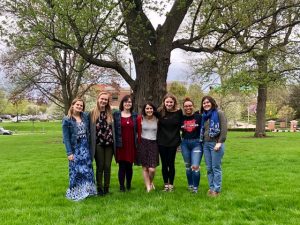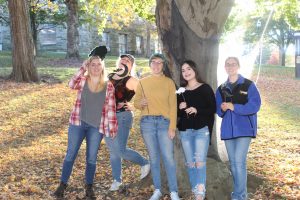You asked and we answered! For our first installment of “Ask an English Major (or Minor),” we are answering an anonymous question from one of Prof. Allison’s ENG 150 students about on-campus opportunities for English majors. Because there are so many of them, we have decided to break this answer up into installments! For Part I, we will cover opportunities within the English Department itself. For Part II, we will cover opportunities across campus. We hope you enjoy this first installment and will consider submitting an “Ask an English Major” question yourself!
“What are on-campus opportunities for English majors and minors?”
The Owl
The Owl is Ohio Wesleyan’s student-run literary journal. Students are involved in every aspect of publication, including soliciting submissions, selecting and editing student manuscripts, working with writers in the revision of work, designing the magazine’s aesthetic and layout, creating and promoting online content, and launching the journal. If you’re curious about the world of literary publishing, the Owl is a great opportunity to learn from the inside. Symone Mann (’19) had this to say about her experience on the editorial board: “My time working for the OWL Magazine was an extremely valuable experience. Not only did I get to work with a group of amazing women, but I also got a glimpse into the life of publishing that you just can’t read about. In addition, I was lucky to have my time with literary and art magazine put on my resume because that experience is partly the reason that I’m employed right now.” You can work on the Owl by registering for ENG 496, which is divided into two half-unit sections, one in the Fall and one in the Spring. Working on the Owl is a full-year commitment.

The 2018-2019 Owl Editorial Board with Faculty Advisor Prof. Butcher
The Sturges Script

An 1896 edition of Emma from Beeghly’s Rare Books Collection profiled by Sierra Mainard for the Sturges Script
The Sturges Script (which you’re reading right now–meta!) is the English department blog. It publishes stories by and about OWU English majors, minors, alums, faculty, and friends, and is run as an internship for credit via ENG 495. Although certain sections of the blog are consistent from one semester to the next, interns have the opportunity to focus on elements of publishing of most interest to them, from site design and content curation to writing, editing, interviewing, and promotion. Sierra Mainard (’21), Managing Editor for the Sturges Script in Fall 2018, had this to say about her experience on the blog: “Working at the Sturges Script has been one of my favorite experiences at OWU! I learned so many valuable skills, got to work on my time management, and just had a genuinely fun time. Starting a new section of the blog highlighting pieces from OWU’s own Rare Books Collection (“Tomes and Treasures”) was my favorite part, as I got to learn all about the different artifacts we have as well as the details of how such a collection is kept. These are all experiences that I can take into nearly any field I choose to pursue, and it gave me some pointers on what kind of careers I should look into as well. I couldn’t recommend it more!” Internships on The Sturges Script are by instructor permission only, with interviews being held toward the end of each semester.
The English Student Board
The English Student Board serves as a liaison between the English faculty and students. Members of the Board participate in the faculty evaluation process, organize informational and social events for majors and minors, serve on faculty search committees, curate content for Sturges hallway displays, and provide feedback to the English Department on its latest initiatives. Kaitie Welch (’20) had this to say about her experience as a two-time member of the Board: “Being on the English Student Board has been such a rewarding experience. It has provided me with skills that will be helpful when entering the workforce, such as event planning, conducting work evaluations, and collaborating with others! Being on the board has also brought me closer to other students in the department who I’m happy to call my friends!” Members of the Board are elected by their peers each Spring for the following year and are approved by the English faculty. Serving on the Student Board is a full-year commitment.

The 2019-2020 Student Board at this year’s Spooktacular Fall Gathering
Directed Readings
The English Department offers courses on everything from “The Song of Roland” to Salman Rushdie, but chances are there’s a course you wished the department offered but doesn’t. This is where ENG 491: “Directed Readings” can be a game-changer. In a Directed Readings, you curate, in consultation with a faculty supervisor, a syllabus of readings and assignments on a topic of interest to you both, and then meet to discuss the course material one-on-one–or, if your topic is of interest to several students, in a small group. It’s like a private class! Fairness in advertising: Because Directed Readings require faculty to meet with students on top of their regular teaching schedules, there is no guarantee that a faculty member will be able to take on a Directed Reading in a given semester; and, if they are able, faculty may suggest revisions to a course topic or reading list to leverage their expertise or to ensure a level of rigor equivalent to a full-unit course. Creating a Directed Readings is therefore a collaborative process involving negotiation among all parties. So, if you are interested in doing a Directed Readings with a professor, be sure to approach them well in advance of the semester in which you are interested in doing it. Pro-tip: Faculty are usually most receptive to Directed Readings when a student has proven their work ethic and conscientiousness in a regular class–another reason to always do your reading and put in your best effort on assignments!
Independent Studies and Honors Projects

Anthony with his Dungeons & Dragons manuals and dice
Like Directed Readings, Independent Studies (ENG 490) are usually on topics selected by students in consultation with faculty. However, instead of a syllabus of readings and assignments, they usually take the form of a special project–in the English Department, typically a long research paper (although it may take other forms). The development of such a project can be an immensely rewarding experience, providing students with an opportunity to follow an idea from conception to completion. For this reason, some students even decide to extend an Independent Study into an Honors Project. Anthony Padget-Gettys (’20) had this to say about his Independent Study and Honors Project with Prof. Allison on narratives in Tabletop Role-Playing Games (TRPG), such as Dungeons & Dragons : “Working with Dr. Allison on both an Independent Study and an Honors Senior Thesis on Tabletop Role-Playing Games (TRPG) has been amazing. It is invaluable to have expertise available to both guide your work and point you where to start. Without his help, I would have had no idea where to begin writing about TRPG narratives, but with Dr. Allison’s suggestions and feedback, I’m well under way. There’s no better way to work on a niche subject you enjoy than to find a professor who understands it and can help you dive in.” As with Directed Readings, Independent Studies are usually best undertaken with faculty with whom you have taken a class.
Department Office Student Worker
A dozen faculty, dozens of classes, and one of the most popular majors on campus–the English Department is a busy place, and there is a lot to do to keep the trains running on time! To help with this effort, every semester the English Department takes on several student workers to assist with the daily routines of running the department. Tasks include everything from making photocopies, picking up mail, and tending to classroom needs to designing flyers, posting to the department’s social media accounts, and helping prepare for department events. Like all office jobs, working in the department office often involves a combination of putting out short-term fires and long-term planning; however, for those who enjoy juggling projects of different kinds, it can be a rewarding campus job that also offers an inside glimpse of the department. Kirsten Whitford (’19) had this to say about her experience as an English student worker: “One of my favorite things about working in the office was the relationships I created with professors and students and, best of all, Sharon Schrader, who is so wonderful and does so much for the department. I was able to grow both organizationally and creatively, which has helped me a lot though my post grad life.” Student workers tend to be hired toward the beginning of the semester, so, if you are interested, inquire in the early Fall or Spring.

